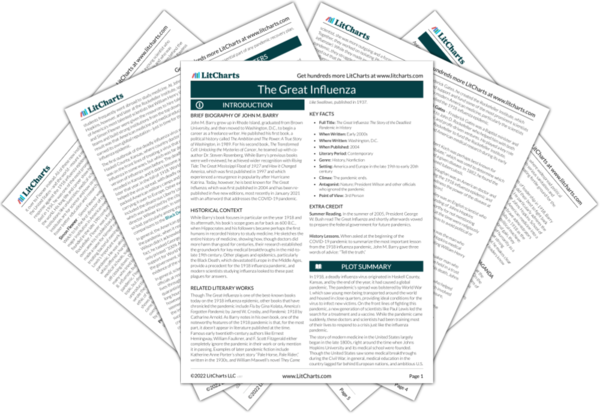Paul Lewis Quotes in The Great Influenza
The Great War had brought Paul Lewis into the navy in 1918 as a lieutenant commander, but he never seemed quite at ease when in his uniform. It never fit quite right, or to sit quite right, and he was often flustered and failed to respond properly when sailors saluted him.
As the virus moved, two parallel struggles emerged.
One encompassed all the nation. Within each city, within each factory, within each family, into each store, onto each farm, along the length of the track of the railroads, along the rivers and roads, deep into the bowels of mines and high along the ridges of the mountains, the virus would find its way. In the next weeks, the virus would test society as a whole and each element within it. Society would have to gather itself to meet this test, or collapse.
The other struggle lay within one tight community of scientists. They—men like Welch, Flexner, Cole, Avery, Lewis, Rosenau—had been drafted against their will into a race.
Lewis knew full well that little of what he was doing was good science. It was all, or nearly all, based on informed guesswork. He only worked harder.
As he worked, the society about him teetered on the edge of collapse.
The greatest questions remained the simplest ones: What caused influenza? What was the pathogen? Was Pfeiffer right when he identified a cause and named it Bacillus influenzae? And if he was not right, then what did cause it? What was the killer?

Paul Lewis Quotes in The Great Influenza
The Great War had brought Paul Lewis into the navy in 1918 as a lieutenant commander, but he never seemed quite at ease when in his uniform. It never fit quite right, or to sit quite right, and he was often flustered and failed to respond properly when sailors saluted him.
As the virus moved, two parallel struggles emerged.
One encompassed all the nation. Within each city, within each factory, within each family, into each store, onto each farm, along the length of the track of the railroads, along the rivers and roads, deep into the bowels of mines and high along the ridges of the mountains, the virus would find its way. In the next weeks, the virus would test society as a whole and each element within it. Society would have to gather itself to meet this test, or collapse.
The other struggle lay within one tight community of scientists. They—men like Welch, Flexner, Cole, Avery, Lewis, Rosenau—had been drafted against their will into a race.
Lewis knew full well that little of what he was doing was good science. It was all, or nearly all, based on informed guesswork. He only worked harder.
As he worked, the society about him teetered on the edge of collapse.
The greatest questions remained the simplest ones: What caused influenza? What was the pathogen? Was Pfeiffer right when he identified a cause and named it Bacillus influenzae? And if he was not right, then what did cause it? What was the killer?











